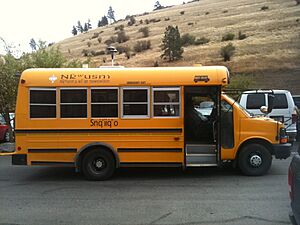Salish-Spokane-Kalispel language facts for kids
Quick facts for kids Salish |
||||
|---|---|---|---|---|
| Séliš (fla) Npoqínišcn (spo) |
||||
| Region | Northwest, United States | |||
| Ethnicity | 8,000 Pend d'Oreilles (Kalispel), Flathead, Spokane peoples (1977–1997) | |||
| Native speakers | 70 (2009-2013)e18 | |||
| Language family |
Salishan
|
|||

|
||||
|
||||
The Salish language, also called Séliš or Montana Salish, is a special language. It is spoken by some elders from the Flathead Nation in Montana and the Kalispel Indian Reservation in Washington state. Some elders from the Spokane Indian Reservation in Washington also speak it.
As of 2012, experts say Salish is "critically endangered." This means very few people still speak it, and it is at high risk of disappearing. In 1977, about 8,000 people were part of the Salish ethnic group. But most of them have now switched to speaking English.
Different groups speak slightly different versions, or dialects, of Salish. These include the Spokane, Kalispel, Pend d'Oreilles, and Bitterroot Salish people.
Salish is a unique language. It is known as a polysynthetic language. This means that words can be very long and packed with meaning. They often combine many ideas into one single word. Unlike English, Salish does not always clearly separate nouns (like "tree") and verbs (like "run"). For example, a Salish phrase that might seem to mean "I killed a deer" could be translated as "I killed it. It was a deer."
Contents
Saving the Salish Language
Many people are working hard to keep the Salish language alive.
Schools and Classes
- The Nkwusm Salish Immersion School in Arlee, Montana teaches students the language.
- Public schools in Kalispell, Montana offer Salish language classes. They also have a "language nest" where young children learn the language naturally.
- Adults can get special training to learn Salish too.
- You can even find an online Salish Language Tutor and online lessons for Kalispel Salish.
Books and Resources
- A big dictionary called "Seliš nyoʔnuntn: Medicine for the Salish Language" was made. It grew from 186 pages to 816 pages in 2009!
- There are also children's books and language CDs to help people learn.
College and Teachers
Salish Kootenai College offers courses in the Salish language. They also train new Salish language teachers. This is part of their effort to make sure the language continues. A group called Yoyoot Skʷkʷimlt (which means "Strong Young People") teaches Salish classes in high schools.
Fun Ways to Learn
- Salish-language Christmas carols are popular for children's holiday shows. These shows have even been on the Salish Kootenai College television station.
- Salish-language karaoke is a fun activity at the yearly Celebrating Salish Conference in Spokane, Washington.
Signs and Names
- On U.S. Route 93 in the Flathead Indian Reservation, many signs now show the old Salish and Kutenai names for towns, rivers, and streams.
- The Missoula City Council is also asking for help from the Salish-Pend d'Oreille Culture Committee. They want to put up Salish-language signs in the City of Missoula.
How Salish Words Work
Salish words are built in a special way. They use small parts called "morphemes" to add meaning. Instead of separate words, these small parts are added to a main word.
For example, in the Spokane dialect of Salish, there are special parts that show if a verb needs an object (like "I opened it") or not (like "He died").
There is also a "SUCCESS" part that can be added to a word. This shows that an action took more effort than usual.
- If you say "I marked it," it's simple.
- But if you add the "SUCCESS" part, it means "I had a hard time marking it."
Sometimes, another part called "OUT-OF-CONTROL" is added. This shows that an action happened by accident. So, you could say:
- "I stabbed it."
- "I managed to stab it." (with effort)
- "I managed to stab it by accident." (with effort and by accident)
These small parts help make Salish words very rich in meaning!
 | Kyle Baker |
 | Joseph Yoakum |
 | Laura Wheeler Waring |
 | Henry Ossawa Tanner |


